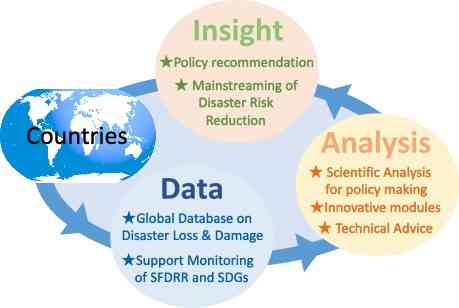Global Centre for Disaster Statistics (GCDS)
The Global Centre for Disaster Statistics (GCDS) aims to support the monitoring and evaluation of progress in the implementation of the Sendai Framework for Disaster Risk Reduction, in its seven global targets.
Description
The activities of GCDS are partly focused on establishing a global official database of disaster damage statistics to monitor and evaluate progress toward the SFDRR and on empowering countries capacity for governance on disaster risk reduction. In our project, the following outputs are expected: i) National capacities for disaster statistics are strengthened, ii) Global information platform for the analysis of disaster statistics is developed, and iii) Independent scientific analysis of progress towards the achievement of the Global Targets of the SFDRR and the SDGs is carried out. As for academic contributions, the GCDS publishes the special issue of the Journal of Disaster Research towards the development of disaster statistics. The contributions of many related institutions will be needed to support countries that are not fully capable of implementing SFDRR in a consistent manner by themselves. Also, mutual communication and cooperation will be the key for quick implementation of the SFDRR.
Did the Sendai Framework change or contribute to changes in your activities/organization? If so, how?
Yes. The GCDS was established in partnership with the International Research Institute of Disaster Science (IRIDeS) at Tohoku University, UNDP, Fujitsu and other organizations, with the objective of support to achieve the SFDRR and SDGs. The creation of the partnerships for the GCDS was also in part influenced by the need of relevant, reliable and disaggregated data and statistics stated in the SFDRR. This is relevant across all four priorities for action.
What led you to make this commitment/initiative?
What was your position before making this Voluntary Commitment / prior to the Sendai Framework?
In the expectation that outcome-oriented targets would be included in the new framework for disaster risk reduction, UNDP and IRIDeS had started a discussion on potential collaboration to support their implementation by developing a global database for disaster damage based on previous efforts, including the use of DesInventar. Thus we were prepared and able to establish the GCDS in Tohoku University in April 2015. The aims were to support SFDRR monitoring and evaluation of the progress by providing national statistics on disaster damage and by establishing an improved global database of such statistics.

